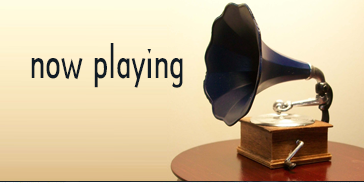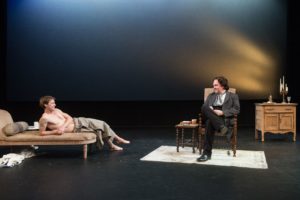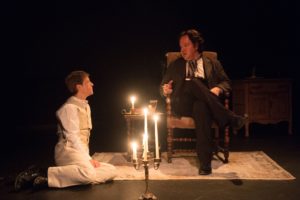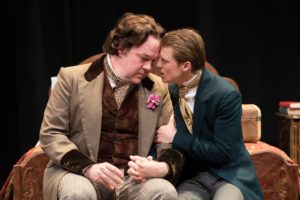
Rob Nagle and Colin Bates (all photos by Jenny Graham)
Irish playwright Oscar Wilde and the spoiled young aristocrat Lord Alfred (Bosie) Douglas are one of modern history’s most famous or infamous couples. Their names are forever linked because of the notoriety of the three 1895 trials that led to Wilde’s bankruptcy, imprisonment, exile and early death at the age of 46. Wilde was a renowned aesthete, essayist and speaker, married with two children when he originally explored homosexuality with his first lover, Robbie Ross. Their sexual relationship did not last but their friendship did. It was in 1891, after publication of his only novel, The Picture of Dorian Gray about a young, hedonistic young man who makes a Faustian deal to remain young while his portrait shows the ravages of his way of life, that Wilde met Douglas. He was infatuated with the handsome youth, roughly half his age, and indulged all his whims. It was Douglas that introduced Wilde to the underside of London gay life, the rent boys and rough trade that was later to be exposed at his trials. Douglas and his father had a tempestuous relationship that led the Marquess of Queensbury to publicly label Wilde a sodomite. Encouraged by Bosie to sue his father for libel, Wilde did and soon his whole sordid life was public fodder. He lost his suit for libel and in turn was arrested and tried for “gross indecency,” eventually being sentenced to two years of hard labor. Upon his release in 1897, Wilde moved to France and never returned to England.
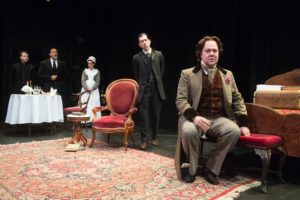
Matthew Campbell Dowling, Will Dixon, Mara Klein, Darius De La Cruz and Rob Nagle
There have been several films detailing Wilde and Bosie’s affair with actors such as Robert Morely, Peter Finch, Stephen Fry and Rupert Everett portraying Wilde. There have been many stage works about both Wilde and Bosie such as The Importance of Being Oscar, Oscar Wilde, Diversions and Delights and Gross Indecency: The Three Trials of Oscar Wilde. Most of these works relied heaving on the writings of Wilde and on transcripts from the trials. In 1998 famed British playwright David Hare, known for his political works critical of Margaret Thatcher’s government and British society as a whole, wrote The Judas Kiss. Hare’s play examines two momentous days in the lives of Wilde and Douglas. Act One is subtitled “Deciding to Stay” and is set on the afternoon that Wilde’s libel trial against Queensbury was dismissed and instead a warrant was issued for Wilde’s arrest. Act Two takes place in Naples in 1897, on the day Wilde and Douglas see each other for the final time. I must admit that Hare, with plays such as Plenty, Pravda, The Secret Rapture, Amy’s View, Racing Demon, The Blue Room, Stuff Happens and others, is my favorite living playwright. He did not disappoint me with The Judas Kiss in which he takes the very familiar characters of Wilde and Douglas yet manages to give them new depth and texture.
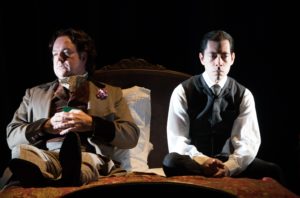
Rob Nagle and Darius De La Cruz
Pasadena’s Boston Court has mounted a very strong production of The Judas Kiss under the nuanced and deft direction of Michael Michetti. Se Hyun Oh’s scenic design does not try to hide its theatrical origins. Light trees are shown, the back wall is a drape for act one and a blank white screen upon which lighting designer David Hernandez can paint his dusk to dawn color scheme in the second act. Dianne K. Graebner’s costumes are period and functional. Michetti, his tech crew and his seven person cast know that the words and emotions are the most important feature of this production.
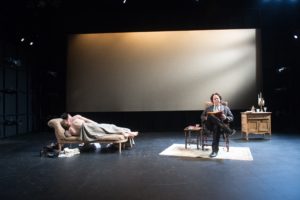
Colin Bates, Kurt Kanazawa and Rob Nagle
The action begins on April 5, 1895 with a naked young man (Matthew Campbell Dowling) and a naked young woman (Mara Klein) having rambunctious sex in the bed of a hotel suite that shows the aftermath of some hard drinking and lusty eating. A knock at the door disturbs the rutting couple and we soon discover they are employees of London’s The Cadogan Hotel and its manager Mr. Moffatt (Will Dixon) wants them to tidy up the room for the imminent return of Oscar Wilde. Wilde’s close friend Robert Ross (Darius De La Cruz) soon arrives as does the high-spirited and easily agitated Lord Douglas (Colin Bates). Wilde’s libel trial against Douglas’s father has been dismissed and the rumor is that an arrest warrant will be issued shortly for Wilde for the crime of “gross indecency.” Ross and Douglas take adversarial positions over Wilde’s next course of action when Wilde (Rob Nagle) finally arrives. Ross thought he had convinced Wilde to flee England before he was arrested, even going to his home, packing clothes and books and cashing a check for funds. Douglas wants Wilde to stay and defend himself, still pitting Wilde against his own father. The hotel employees can only look on silently as the drama is played out before them. Wilde can never seem to say no to Bosie and eventually he stalls long enough to miss the last train to Dover and his last chance at escape. He easily convinces Bosie not to stay and witness his arrest and Bosie eagerly agrees, but the loyal Ross joins Wilde in waiting for the inevitable knock on the door by the police.
Act Two takes place on December 3, 1897 in a rundown Naples villa where Bosie has invited Wilde to join him, as long as he pays the bills, after his release from prison. Wilde sits in a chair reading while nearby sprawl the naked bodies of Bosie and a young Italian fisherman (Kurt Kanazawa) who never did make their way up to the bedroom for their lovemaking. Ross visits them briefly on behalf of Wilde’s estranged wife who is threatening to cut off his meager allowance unless he gives up Bosie. Unfortunately this is something Wilde can still not do. Bosie can’t live without Wilde’s money and decides to take his mother’s offer of reconciliation and a yearly income. But he wants Wilde to be the one to tell him to leave. The spoiled and indulgent brat still controls Wilde. He even has the effrontery to say he feels he has suffered more than Wilde because Wilde is old while he is still young and has his whole life ahead of him.
There is remarkable beauty in the writing of their scenes and in the playing of them by Nagle and Bates. Bates has all the haughty privilege of his position, both social and sexual. He knows Wilde and other men are addicted to his youth and beauty and he masterfully manipulates them. He’s not quite a villain yet his actions are self-indulgent, unthinking, hurtful and harmful. Nagle is a revelation as Wilde, perhaps giving a career-defining performance even though he still has a long career ahead of him. His Wilde easily spits out the witticisms but it is in his quieter moments that the tragedy of his life becomes shatteringly real. It’s a marvelous portrait of a genius ruined by his baser appetites and his love of beauty.
There is the human tragedy of Wilde’s early death as a result of his two years of imprisonment, but the real tragedy was the loss of this masterful writer. In six short years, Wilde wrote his one novel and his four society comedies, including one of the greatest plays ever written The Importance of Being Earnest. Earnest had just opened to raves shortly before Wilde’s trials began. After his imprisonment, Wilde only published the poem, The Ballad of Reading Gaol, and his 50,000 word letter to Bosie, De Profundis. I always wonder what else he may have written had he fled England when he had the chance, or even better, refused to be badgered by Bosie into fighting his battles with his father. As they said about King Kong, “It was beauty killed the beast”. So it is here that beauty destroyed the genius. In his final words to Bowie in Hare’s masterful telling, Wilde muses that the Bible got it wrong. Christ was betrayed by Judas, a man he barely knew. “It would be artistically truer if he were betrayed by John. Because John is the man he loves most.” See The Judas Kiss. It is sure to be one of the highlights of the 2019 theatrical calendar year in Los Angeles.
Boston Court Pasadena, 70 N. Mentor Court in Pasadena. Ends March 24. Bostoncourtpasadena.org

